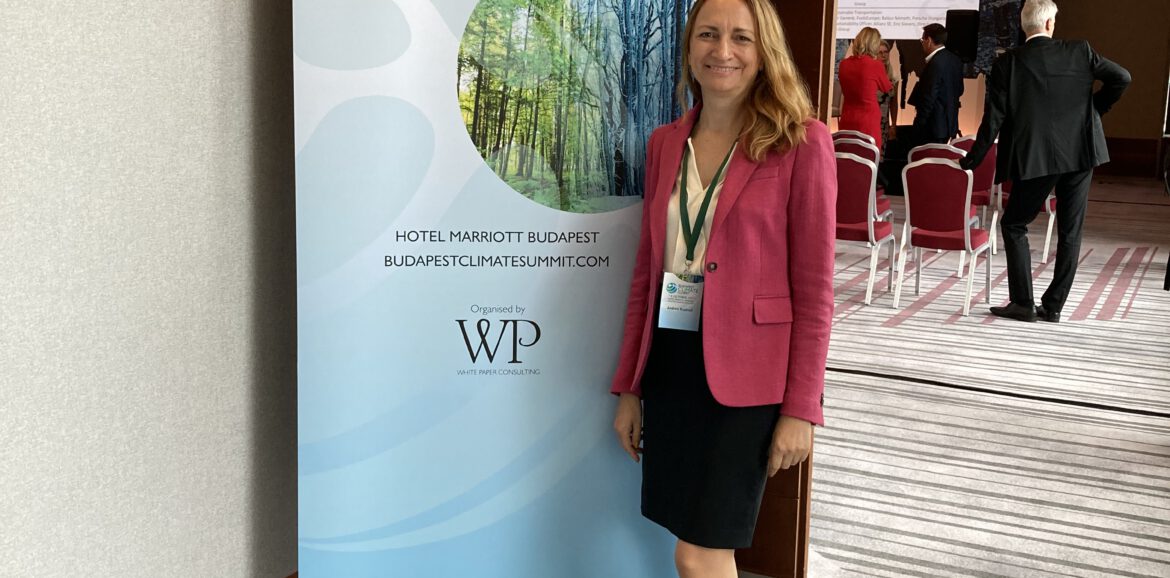The anticipation and the tension is palpable. On Thursday morning, a few minutes before 9 am, the conference hall of the Marriott Hotel in Budapest fills up slowly but surely. The shining panorama of Buda refreshes the mood before the start of the climate summit. I’m happy to take a seat in the second row because I like to follow the presenters closely and focus as much as I can on what I’m here for.
On October 7 and 8 hundreds of women and men from Hungary and many European countries came together to share, evaluate good practices, set an example and encourage action on climate goals. National and European decision-makers, authorities, municipalities, small and large companies and young activists were all represented amongst presenters, panelists and in the audience, too.
The patron of the conference was the President of Hungary, and his person and opening speech enhanced the importance of the event.
My feelings during the summit were rather positive, though I had to admit there were also some mixed ones.
Part of me felt full with faith, reinforcing and motivating energy, and on the other hand, I felt the pressure of the responsibility.
I was sure that everyone who was there understood and sensed his own stake and responsibility, and already actively contributes to the future. I kept asking myself how this belief and hunger for action can be nurtured in those who were not sitting at that or at other similar stakeholder tables, in those places where the engine of responsibility on the climate issue had not yet started. I have also learned the lesson for myself that I need to do more and differently, thus I must choose much more emphatic and effective ways to advance the cause.
I have come up with three main messages and an action plan for myself:
- A small deed counts, sometimes more than hundreds of plans and strategies
- Mindset change is going to be essential, and we can achieve this with education and good examples
- give young generations a much bigger role in decisions and actions – yet it is about their future
Let’s take a closer look at all of these.
One of the most captivating topics for me was about smart cities. Pekka Timonen, Mayor of Lahti, presented the results of the Finnish municipality with 120.000 inhabitants. Lahti won the European Green Capital title in 2021. The city has set a goal of achieving carbon neutrality as early as 2025, 10 years before the national target date. Going nicely step by step, the residents are building their green town together, first cleaning Lake Vesijarvi, such as today 99% of the household waste is recycled. The leaders of the town are constantly training themselves in the field of climate-friendly city management and project management together with the leaders of other Finnish cities and are also devoting energy to sharing good practices with other cities and even other countries. The city’s motto is, “A sustainable future calls for action, not just talk”. Pekka Timonen also emphasized that what has been achieved in Lahti can be achieved anywhere, it really requires action, the first and then the next steps, systematically moving towards the goal.
We have many and increasingly important opportunities as individuals, entrepreneurs and corporate leaders. From cleaning up the living environment, to selective waste collection, to saving energy and water, we can already do a lot with a relatively small effort.
We just have to get it started, then we get a taste of it and move on. Eliminating or at least minimising plastic packaging, composting, stormwater collection, installing solar panels, insulating and – women may like it – less ironing, may well require more effort and financial investment, but are still within the comfort zone, at least I think so. And there is another important aspect, if we have savings and want to invest it, then invest in green companies, funds. Let us also strengthen our faith in a sustainable future with financial responsibility and risk-taking.
As a business leader, one of my initiatives was to procure green electricity. Yes, the cost of green electricity is higher, and this is an investment at the expense of profit, at least initially. But this may prompt us to find energy efficiency opportunities. And then this is the second step towards carbon neutrality, as it is the greenest energy that we do not use. This slogan was a recurring motive at the Budapest Climate Summit. To sum up the first thought: every little step counts, possibly much more than a dozen plans or speeches, or even thousands of such blogs.
Mindset change and the involvement of the younger generations are no less important.
One of the most enduring messages to me was that without a radical change in consumer attitudes, we will not be able to achieve the Paris climate targets, we will not be able to sustain our habitat for our children and grandchildren. The term radical here also really means a substantial lifestyle change. Let me mention a single specific example. The question arose as to whether we could accept that there would not always be electricity in our homes. The spread of renewable energies and the capacity of the distribution infrastructure, with accessibility of the present technologies, can result in the green energy supply being intermittent, ie there will be power outages.
I grew up as a child in the literally dark Romania of the ’80s, where we spent quite a bit of time wandering by candlelight, and we heated the bath water on a gas-cylinder stove. Therefore, I deeply oppose this idea, for me it is really outside the comfort zone, it would be difficult to reorganize life and adjust it to the electricity supply. But it may be a very real scenario that we consumers also have to make serious sacrifices. The efforts of decision-makers and companies can only achieve real change through the cooperation and adaptation of everyday consumption.
It is no coincidence that the most striking message from the speakers at the conference was the need for a change of attitude and this can be achieved through consistent and effective education for the whole society.
It was refreshing at the conference that the proportion of women among the speakers and participants was close to 50%. Women have and will have an equally important interest and role in shaping a sustainable future and carbon neutrality. I consider the greater role of women and social equality to be an important mission of mine, so I was personally pleased that more and more women are taking part in central and local decision-making, in business roles and at this conference.
It is equally important that young people play an increasing role in decision-making and implementation, yet it is about the future of them and their children. It is commendable that the team organizing the conference, has also specifically addressed the opinions of future generations in a Climate Youth section. It also gives me ammunition to see young people very much preoccupied with a sustainable future.
Among the participating young people, Gábor Kiss at the age of 16 bravely and maturely stood in front of a large number of people and shared in English his mission in setting an example of responsibility for a sustainable future for other teens. What’s more, he’s been working on this since he was 14 years old. Roxána Kunos, Unicef’s youth ambassador, has consistently called for the voices of children and young people to be included in local decision-making since the age of 11. She claims that without including the youngsters, we cannot build a world that is livable for them.
Although I highlighted a few moments that were crucial for me at the conference, I would like to thank all the speakers and organizers in particular for inspiring me to take our world one step closer to a sustainable, accepting and happy future.
Because there is always a sustainable solution in every situation!
Couple of main EU climate goals and their development:
- European Green Deal (December 2019) set the goal of:
- By 2050, Europe should be the first climate-neutral continent
- By 2030, net greenhouse gas emissions must be reduced by at least 40% compared to 1990 levels.
- By 2030 the share of renewable energy in EU energy consumption should be at least 32%. (According to the Renewable Energy Directive adopted in June 2018)
- European Climate Law (July 2021)
- By 2030, net greenhouse gas emissions must be reduced by at least 55% compared to 1990 levels. (currently 24%)
- By 2030, the share of renewable energy in EU energy consumption should be at least 40%.





